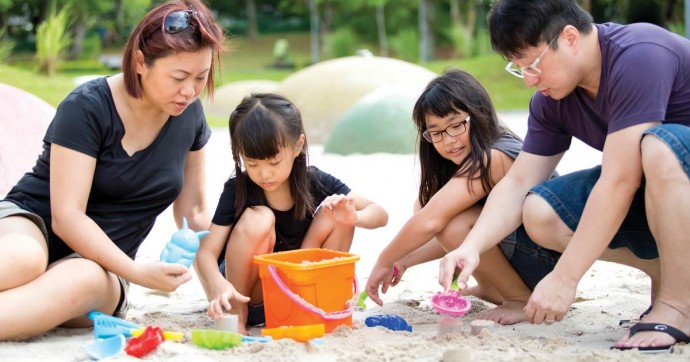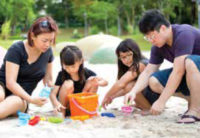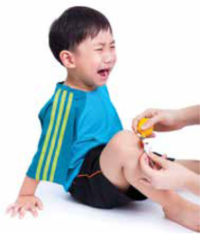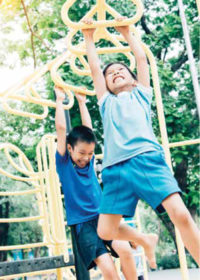The world we live in is one of constant evolution and change. As parents, wanting to protect our children from the ups and downs of life is normal. However, in order to prepare them for life as an adult, we need to raise them to be resilient. This is crucial as it allows them to bounce back from failures and face any uncertainties with equanimity. Resilience is not an innate trait and much of it comes from external factors, starting with a child’s parents and caregivers.
Experience is the best teacher
Every experience in life helps build resilience. Be supportive and encourage them to explore their environment on their own. Some parents may have fond memories of catching fish in drains near their house, hunting for frogs or tadpoles, or even just splashing in a muddy field while playing football after it rains. Don’t deny your child the chance to have such experiences and memories of their own!
Children of all ages should spend at least one hour to play outdoors every day:
- Cycle around your taman
- Walk, run, or play at a nearby park
- Fly a kite in the park
- Play a quick round of badminton or football
Weekends are also a great time to have fun together as a family:
- Go for family picnics at parks or other outdoor places
- Enjoy a day at the beach
- Take a hike through nature trails
- Go camping during weekends
Outdoor play is important for us all to get our daily dose of Vitamin D from the sun. It also gives your child the chance to find their strengths, abilities and fears through considered risk. Simple playground activities such as the monkey bar can actually challenge your child to be more daring, self-reliant, and to persevere to reach the end. Playing hide-and-seek can challenge him to be more resourceful and to learn to adapt to situations or conditions. Playing with other children also helps build stamina and healthy competition.
There are also other fun activity options such as indoor rock climbing, ice skating and trampoline parks. On days when you cannot go out (due to rain or haze), be creative and let him play indoors with old-style games, e.g. teng-teng or hopscotch.
A strong body is important
While building emotional resilience is important, parents should also remember to nurture their child’s physical health. A strong body means he will be less prone to illness, so you will have less to worry when he plays outdoors.
While this does mean that he will be exposed to more germs and such, keep in mind that such exposures will ultimately lead to a stronger body. Some scientists subscribe to the ‘hygiene hypothesis’, which simply means that a highly sheltered early childhood with little to no exposure to germs, bacteria, and other microorganisms prevents the immune system from reaching its full potential, i.e. the child may grow into an adult who is more prone to illness or allergy.
So don’t be too worried about a little dirt, scratches, tumbles or falls. It’s a part and parcel of growing up and experiencing the joy of playing, the pain from a skinned knee if he falls, and the courage and tenacity to pick himself up to continue playing. Being exposed to the outdoors will not only build his character, but also strengthen his body physically.
In addition to that, his nutritional needs should be met also in order for him to grow and develop properly. Having a strong and healthy body means fewer missed opportunities or experiences. In short, the basics for a strong and healthy body are:
- Ensure that he is physically active daily.
- Provide him with good nutrition via a balanced and healthy diet.
- Ensure he gets enough rest or sleep every day.
- Stay well hydrated by drinking enough water daily.
The goal to building your child’s resilience should be a strong and healthy body and mind. However, tailor the approach that you use to his developmental stage. Also, remember that every child is different, so be prepared to use a different strategy or approach with each individual child to get the results that you want.
An educational contribution by Malaysian Paediatric Association.











Comments